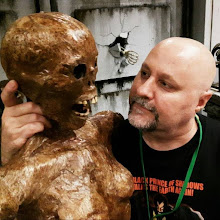From Renfield's newswire: Horror pervades our lives. The emotional experiences based on fear and dread it provides affect us both individually and collectively, and the fascination it exerts is undeniable and ancient, as evidenced by its lurking recurrence in mythologies, folklore, literature, cinema, historical narratives, and virtually every other field of human knowledge and realm of storytelling.
Growing awareness and appreciation of the rich horror traditions of other countries around the world, including Japan, Korea, India, Brazil, Sudan, and Thailand, has highlighted the importance of considering horror in a global context.
Global Horror: Local Perspectives
2nd Global Inclusive Interdisciplinary Conference
Sunday 8th May 2022 - Monday 9th May 2022
Prague, Czech Republic
The Global Horror: Local Perspectives Project provides a platform for exploring the ways in which horror motifs and themes are expressed through the 'local perspectives' that inform the creative practices and daily life of particular nations and cultures. It is not the intent of the Project to exclude Anglo-European and American perspectives from the conversation of global horror, but rather to focus on other horror traditions which have frequently been de-centred or completely overlooked in the past.
The scope of the Project therefore includes work that explores marginalised local perspectives within Anglo-European and American horror, and work that examines Anglo-European and American horror from a global perspective with a view to forming an innovative interdisciplinary publication to engender further research and collaboration.
The paradox of horror lies precisely in the fact we deem it simultaneously appealing and repulsive. We are taught to avoid that which is horrifying, but the appeal of horror, whether in the form of fiction or sensational news, is irresistible. Indeed, we simultaneously narrate, describe, imagine, consume, dread and crave horror in all of its dimensions, and with the most varied goals.
Key Topics
Horror taps into primal emotions of fear and disgust that are universal to the human condition, and finds expression across cultures and historical periods. Yet he texts that shape the ways in which horror is broadly understood historically reflect predominantly Anglo-European and American cultural, social, historical and geographical contexts.
- Case studies of un(der)-represented horror traditions in nations and cultures
- How the history, religion, cultural norms of a nation/culture influence local perceptions and representations of horror in literature, film, television, music, art and videogames
- Impact of digital technology on creating and disseminating local perspectives on horror
- How globalisation as a cultural and economic force influences 'local perspectives' on horror
- Creative practitioners whose work shapes local perspectives on horror
- Dark humour and making fun of global horror
- Connections between horror in everyday life and fictional horror
- Impact of real or fictional global horrors on individuals (mental illness, trauma, nightmares, other physiological symptoms)
- Horror in religious/spiritual systems (martyrdom, grotesque/monstrous deities, rituals, etc.)
Social practices associated to horror: cannibalism, (self-)mutilation, abusive rites of passage, suicide, heresies - Horror in nation-building (slavery, war, genocide, etc.)
- Medical/clinical perspectives: interfaces of horror and medicine; dealing with patients struggling to cope with horrifying experiences
- Educational perspectives: how the curriculum shapes perceptions of horror, its uses and its impacts; horror in children's stories/horror as pedagogical tool, etc.
- The horrifying impacts of the COVID pandemic on our lives
- Technology as agent of horror (weapons, dissemination of fear, etc.)
- How national and international law facilitate and mitigate horror
- Activism as response to horror
- Horror and the media: news coverage, sensationalism
- Horror and space: streets, cities, towns, buildings, deserted areas
- The design of horror: images, branding, advertisement, commercial campaigns involving horror
- Urban legends and local horrors
- Best practice for researching and studying global horror
- Inter-disciplinarity as a tool to overcome the indescribability of horror
There will also be opportunities to explore aspects of horror within Prague.
What To Send
The aim of this inclusive interdisciplinary conference and collaborative networking event is to bring people together and encourage creative conversations in the context of a variety of formats: papers, seminars, workshops, storytelling, performances, poster presentations, problem-solving sessions, case studies, panels, q and a's, round-tables etc. Creative responses to the subject, such as poetry/prose, short film screenings/original drama, installations and alternative presentation styles that engage the audience and foster debate are particularly encouraged. Please feel free to put forward proposals that you think will get the message across, in whatever form.
At the end of the conference we will be exploring ways in which we can develop the discussions and dialogues in new and sustainable inclusive interdisciplinary directions, including research, workshops, publications, public interest days, associations, developing courses etc. which will help us make sense of the topics discussed during the meeting. There is an intention, subject to the discussions which emerge during the course of the meeting, to form a selective innovative interdisciplinary publication to engender further research and collaboration.
300 word proposals, presentations, abstracts and other forms of contribution and participation should be submitted by Friday 26th November 2021. Other forms of participation should be discussed in advance with the Organising Chairs.
All submissions will be at least double reviewed, under anonymous (blind) conditions, by a global panel drawn from members of the Project Team, the Development Team and the Advisory Board. In practice our procedures usually entail that by the time a proposal is accepted, it will have been triple and quadruple reviewed.
You will be notified of the panel's decision by Friday 10th December 2021.
If your submission is accepted for the conference, a full draft of your contribution should be submitted by Friday 8th April 2022.
Abstracts and proposals may be in Word, RTF or Notepad formats with the following information and in this order:
a) author(s), b) affiliation as you would like it to appear in the programme, c) email address, d) title of proposal, e) type of proposal e.g. paper presentation, workshop, panel, film, performance, etc, f) body of proposal, g) up to 10 keywords.
E-mails should be entitled: Global Horror Submission
Where To Send
Abstracts should be submitted simultaneously to the Organising Chair and the Project Administrator:
Claudio Zanini (Organising Chair): haunted32@yahoo.com.br
Len Capuli (Project Administrator): praguehorror@progressiveconnexions.net
Website: https://www.progressiveconnexions.net/interdisciplinary-projects/evil/global-horror/conferences/








0 comments:
Post a Comment